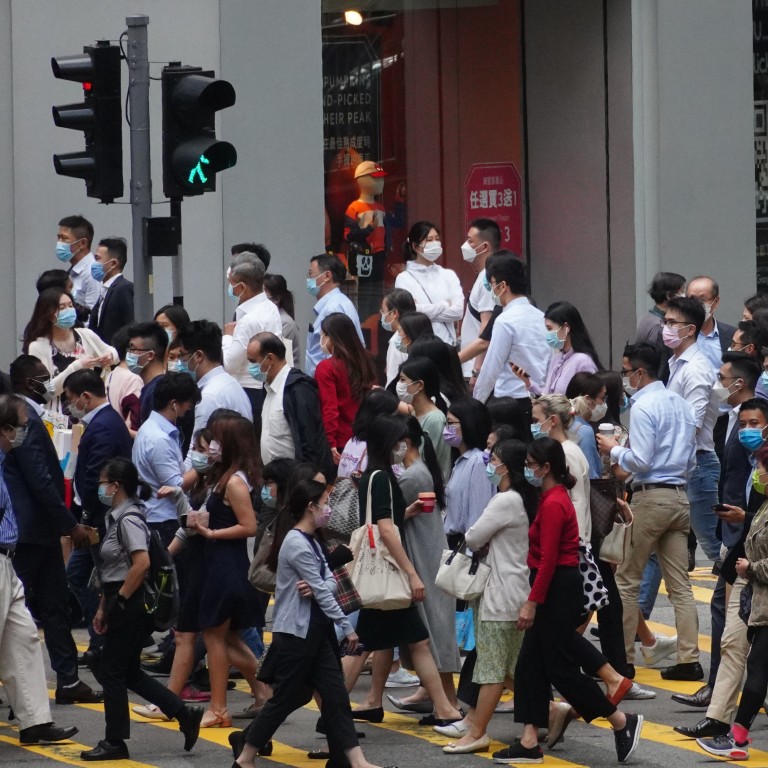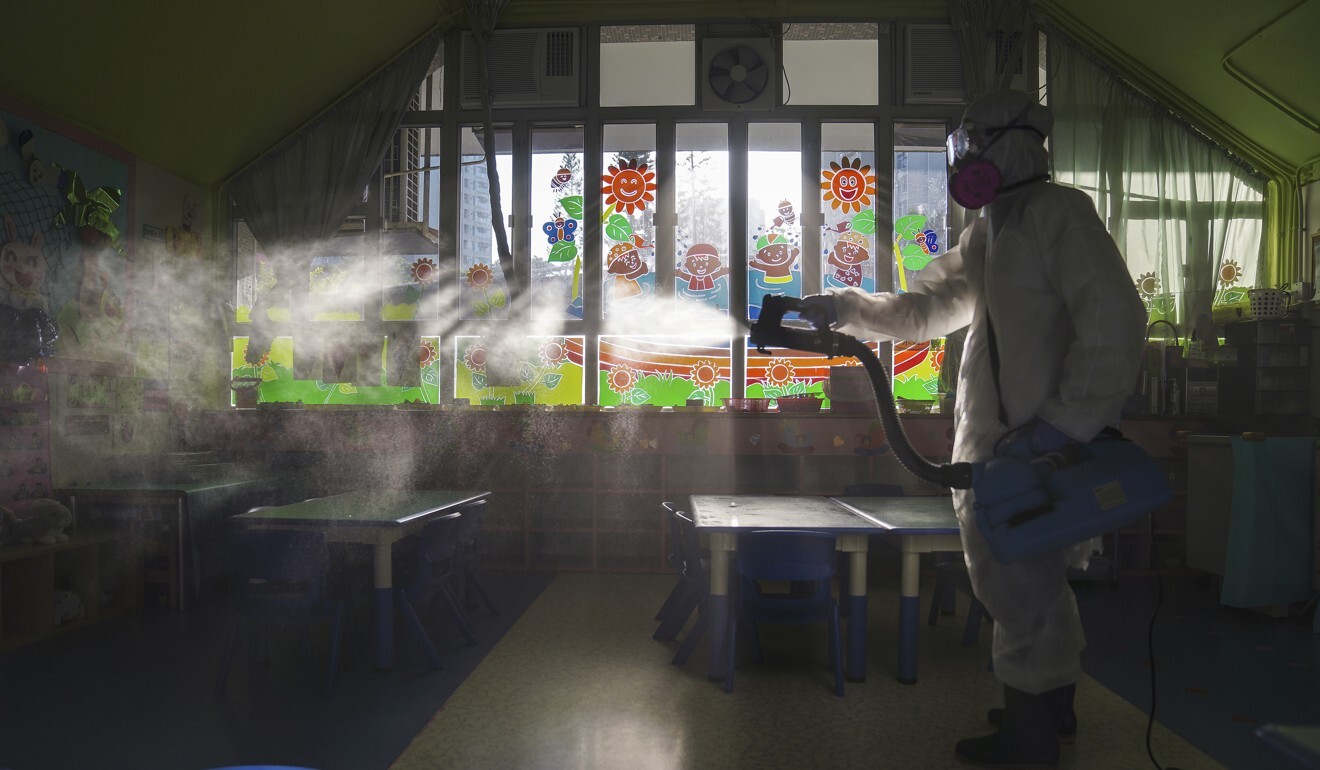
Coronavirus: fears over surge in untraceable cases, as Hong Kong records 23 new infections while double whammy of Covid-19 and respiratory illnesses looms
- A 42-year-old patient whose close contacts are connected to four schools also attended a wedding banquet with more than 200 guests
- The 23 new infections are the most in a single day since September 20 and kindergartens close amid nearly 180 outbreaks of respiratory tract infections
Hong Kong’s health authorities warned of a worrying surge in untraceable Covid-19 cases as they reported 23 new infections on Thursday, while also ordering kindergartens across the city to close due to nearly 180 outbreaks of upper respiratory tract infections.
Public health experts also continued to pile pressure on the government to plug quarantine loopholes and avoid further silent transmissions sparked by imported infections.

So far, there have been a total of 179 outbreaks of upper respiratory tract infections, mostly in schools. An outbreak is defined by three or more children getting infected in a class.
The remaining six local cases were untraceable, of which five involved cabbies and a bus driver, all of whom preliminarily tested positive a day earlier.
The new figures were on top of at least eight others who had tested preliminary positive on Thursday, two with unknown origins.
Health officials said the rising number of infections from unknown sources was a worrying sign, pointing to similarities with the start of the third wave that began in July.
“In the past two days, we’ve recorded an increasing number of local infections that do not have epidemiological links with known cases,” said Dr Chuang Shuk-kwan, head of the Centre for Health Protection’s communicable disease branch.
“Given the high infectiousness of this virus, it is possible we could see more and more cases, either linked or unlinked, in the coming days.”
The latest figures pushed the city’s official case tally to 5,430, with 108 related deaths.
Warning signs of new Covid-19 wave emerge among Hong Kong taxi drivers
The increase in silent transmissions comes ahead of stepped up control measures. From Friday, anyone arriving in Hong Kong from countries other than China will be required to undergo their mandatory 14-day quarantine in a hotel. Previously, residents returning from low-risk countries were allowed to self-isolate at home.
Chuang said the new rules would make it easier to monitor and collect second saliva samples from people for testing. This refers to an ongoing requirement for those under quarantine to be tested again on the 12th day of the isolation period.
Public health experts have urged authorities to ensure travellers serving quarantine will submit test samples on time to minimise the risk of imported infections spreading into the community.
Dr Joseph Tsang Kay-yan, co-chairman of the Medical Association’s advisory committee on infectious diseases, said designating hotels for quarantine purposes could help plug current loopholes.
“Now there isn’t a centralised quarantine arrangement [for travellers]. If there is a designated place for quarantine, [government] staff can be there to monitor,” Tsang said.
He noted that those who were currently quarantined could leave their locations after 14 days, even if they had not received results of their second test.
Hong Kong kindergartens to close after 171 outbreaks of common cold recorded
With some 4,000 quarantine units expected to be in service by the end of this year from ongoing expansion projects in Penny’s Bay, Tsang said these should be reserved for close contacts of confirmed Covid-19 cases, instead of being used for quarantining arrivals from high-risk countries.
Chinese University Professor David Hui Shu-cheong, who is also a government adviser on the pandemic, said health authorities needed to ensure that travellers could only leave their hotel after clearing the second test.
“With the boost in capacity, the Centre for Health Protection must be able to produce test results within 48 hours,” he said. “If [travellers] don’t follow the guidelines and submit their samples on time, penalties may have to be imposed.”
Meanwhile, a 42-year-old salesman with unknown infection origin sparked the temporary closure of four schools, as well as the testing of more than 200 guests at a wedding banquet. An undisclosed number of close contacts of the patient – who lives in Tsing Lung Tau – were sent to quarantine.
The four schools, Learning Habitat Kindergarten in Tsing Yi, Kwok Tak Seng Catholic Secondary School in Sha Tin, Lei Muk Shue Catholic Primary School and Christian Alliance International School in Cheung Sha Wan, have been ordered to shut for disinfection until test results from the man’s contacts are returned.
The wedding banquet he attended took place on October 26, and the organiser has been asked to contact guests for testing. A client the man met while he was already infectious was also sent to quarantine.
The salesman is also known to have eaten at restaurants in Tai Kok Tsui, Prince Edward and Tuen Mun, and reported for work at a Kowloon Bay office building, all during his infectious phase.
Passengers from Nepal may have sparked latest round of cases: top virologists
Two possible cases with unknown origins were also revealed on Thursday – a 56-year-old librarian at Prince of Wales Hospital and a 65-year-old retiree.
A close contact of the librarian’s attends Valtorta College in Tai Po, which has also been shut down for disinfection until test results are available. The retiree, meanwhile, went to services at Tai Kok Tsui Baptist Church on Sunday, where about 60 people were present. The Centre for Health Protection will distribute specimen bottles there.
The wife of one of the taxi drivers among Thursday’s local cases and a family member of the 23-year-old Baptist University student were also among those testing preliminary positive.
The remaining 16 infections were imported, including six from Nepal, two from Turkey and Indonesia, and one each from Britain, Germany, India, the Philippines, Sweden and the United States.
Separately, Nepal Airlines flights from Kathmandu will be placed under a 14-day ban for the third time after 12 passengers on its Tuesday service were found to be infected with Covid-19.
Chuang on Wednesday had said the coronavirus strain recently circulating in Mui Wo, Tung Chung and Tai Po was similar to the type found in Nepal.
Additional reporting by Elizabeth Cheung


